School Year of Core Vocabulary Words: AAC Resources for Month 7 (February) by Michaela Sullivan, Alisa Lego, & Beth Lytle
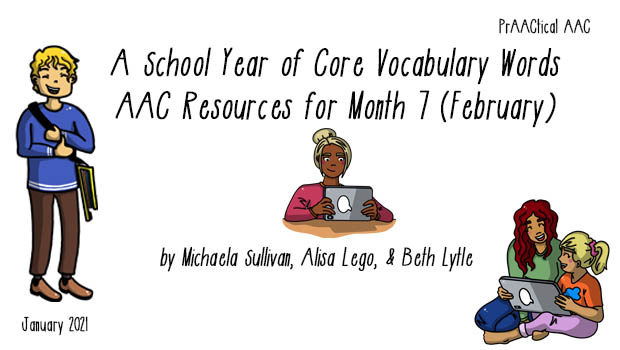
It’s prAACtically February and that means we’re preparing new lessons, materials, and activities for another set of high-frequency words. We welcome back guest authors Michaela Sullivan, Alisa Lego, and Beth Lytle with their latest post in the School Year of Core Vocabulary Words series which focuses on a selected set of words to highlight for the month along. This month, they highlight an important intervention strategy, recasting, that we use to facilitate language development. Also, be sure to check out the helpful Activity Packets, containing sheets on highlighting these words in a variety of activities, and Data Collection Forms.
If you are new to this series, you may want to review the introduction that our series authors created before delving into this month’s target words. You can see the guest authors’ overview here. You can also review the first 6 months of the School Year of Core Vocabulary Words using the links at the bottom of this post.
A SCHOOL YEAR OF CORE INTRODUCTION- February
To the parents, teachers, Speech-Language Pathologists, Paraprofessionals, friends, and other curious professionals or communicators – welcome back to the monthly School Year of Core Words- February 2021 Edition. We are grateful for your support and feedback and hope that our resources will continue to assist you in facilitating and integrating the use of core vocabulary across a variety of situations and activities.
Over the last few months, we have made a concerted effort to focus not only on the needs of young children but also on the needs of young adults. We wanted to try and branch out more and address the many needs of students in school across a wider age range and this has been most evident in the selection of videos, music, animated shorts as well as in the chosen apps and activities within the section on play.
We are thankful for the amazing Core Contributors who have joined our journey and have worked tirelessly to create the activity sheets and resources in the postings. Given our growing team of 30 + Core Contributors, we are now working in teams to create some of the resources collaboratively. We have learned that working together brings diverse and rich ideas that we want to impart on all of you and your incredible students.
Our Featured Core Contributors for the Month of February include:
- Alice Mui
- Jamie Deiner
- Gail Tsujimoto-Cho
- Diana V Angeles
- Amy Burt
- Moira Ikeda
- Wes Heidenreich
- Samantha Lin
- Molly Hartzel
- Sophie Goodwin
- Liz Cambra
- Jessica Oseguera
- Jordan Stuhltrager
- Kelsey Robin
- Abbie Duarte
- Andriana Nikolau
- Shanaz Faisal
- Meaghan Rose Baron
- Beth Kenney
If you’ve ever considered joining us, please do so by emailing us and becoming part of our community of learning and sharing.
Many of the Level 1 and Level 2 words have a direct relationship with the holidays in February. Some such words include but are not limited to: special, imagine, dream, hope, share, beautiful, write, and draw. We hope that you find that many of these core words may seamlessly integrate into your lessons, themes and topics and provide opportunities for communication exchanges.
Enjoy Month 7 of the School Year of Core Words!
THE WORDS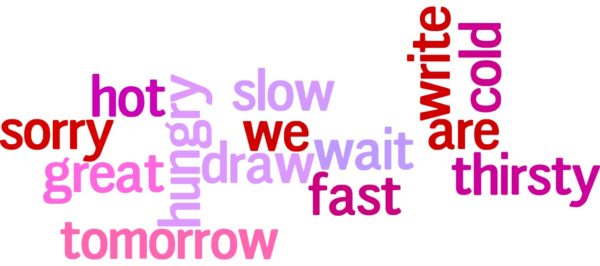
Level 1 words for February: we, are, fast, slow, wait, hungry, thirsty, write, draw, cold, hot, great, tomorrow, sorry
The suggested sequence for implementation is listed below:
- Week 1: we, are, fast, slow
- Week 2: wait, hungry, thirsty, write
- Week 3: draw, cold, hot, great
- Week 4: tomorrow, sorry
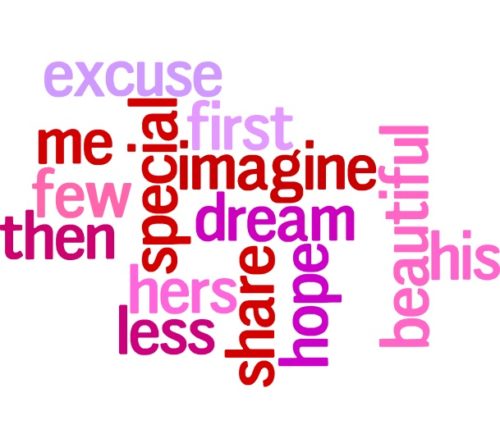 Level 2 words for February: hers, his, share, beautiful, special, imagine, dream, hope, few, less, first, then, excuse me
Level 2 words for February: hers, his, share, beautiful, special, imagine, dream, hope, few, less, first, then, excuse me
The suggested order for these words is listed below:
- Week 1: hers, his, share, beautiful
- Week 2: special, imagine, dream, hope
- Week 3: few, less, first, then
- Week 4: excuse me
THE SYMBOLS
You can download grids with the symbols for this month’s words from the lists below. These handy tools can help us remember what words to focus on and be useful in our intervention and instruction.
Level 1 Words
- Avaz
- CoughDrop
- LAMP Words for Life
- Wordpower 60 Basic
- Unity 45 Sequenced
- Unity 60 Sequenced
- Unity 84 Sequenced
- Blank Grid (add your own symbols)
Level 2 Words
- Avaz
- CoughDrop
- LAMP Words for Life
- Wordpower 60 Basic
- Unity 45 Sequenced
- Unity 60 Sequenced
- Unity 84 Sequenced
- Blank Grid (add your own symbols)
THE ACTIVITIES
These sets of Activity Packets are divided into weeks and can be downloaded for easy access.
Activity Packets for Level 1 Words

Activity Packets for Level 2 Words
STRATEGY OF THE MONTH: Recasting
Once the communicator has acquired a basic vocabulary and has evidenced use of Spontaneous Novel Utterance Generation (SNUG), the evidenced based strategy, RECASTING, is recommended to be implemented to assist in increasing and expanding overall expressive language skills, (especially in the areas of grammar and syntax). (2013, ICAN TM Talk Clinics). Recasting is a form of modeling, where the communication partner immediately responds to the communicator’s utterance by repairing, adding to, or modifying it by using any and all of the following: correct grammar, expanding utterance length and syntax or by adding additional vocabulary to the modeled utterance. An example of recasting might be when a communicator may express: “want cracker” and the communication partner or facilitator may use recasting with the AAC system to model, “I want more crackers, please.” Recasting is in no way punitive or directive as it can easily be incorporated into the dynamic flow of communication without the expectation of repetition.
Please find the following additional resources on Recasting below. These resources will be helpful for individual learning and/or for team training.
We will be incorporating this strategy in all our Activity Sheets surrounding the targeted core words. Until it becomes a habit, create intentional opportunities to practice this skill.
Resources:
- Recasting: A Language Facilitation Strategy by Robin Parker PrAACtical AAC, June 9, 2012
- Recasting: A parent-friendly strategy for language development courtesy of LG Speech Therapy, October 8 2018.
- Recasts and AAC, Courtesy of AACtion Point by I Can Talk AAC Clinic, 2013
- PrAACtical Research: Recasts in AAC Mediated Interaction, PrAACtical AAC, February 17, 2020. By Dr. Kathy Howery
DATA COLLECTION & ACCOUNTABILITY FORMS
Taking data to measure performance and keeping track of our own modeling behavior are two things we can do to strengthen our AAC teaching. Here are some forms that you can use to support those efforts.
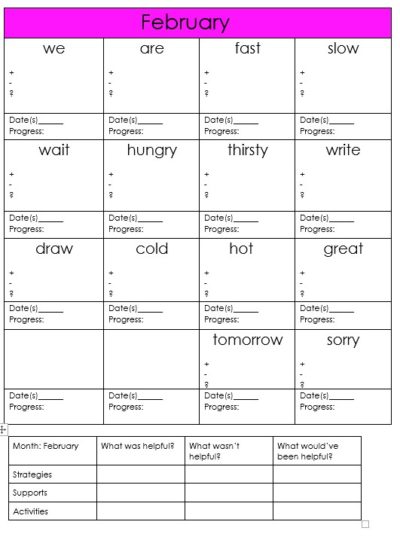 This posting is dedicated to all of you SLP’s, parents, educators, and therapists who are making a difference every day!
This posting is dedicated to all of you SLP’s, parents, educators, and therapists who are making a difference every day!
About the School Year of Core Vocabulary Series Authors
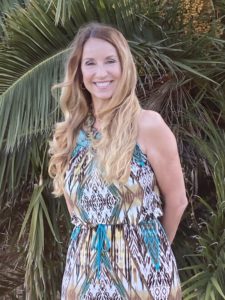 Michaela Sullivan is an SLP who specializes in the fields of AAC and AT. She currently works within the San Francisco Unified School District on the AAC Support Team where she supervises graduate students, works in a transition program and on special projects. Ms. Sullivan also has a private practice. She has been a presenter in the field of SLP and AAC at state and national conventions. She serves as a board member and volunteer for the Nika Project, providing services, supports, resources, training, and repurposed equipment for individuals with complex communication needs both locally and internationally.
Michaela Sullivan is an SLP who specializes in the fields of AAC and AT. She currently works within the San Francisco Unified School District on the AAC Support Team where she supervises graduate students, works in a transition program and on special projects. Ms. Sullivan also has a private practice. She has been a presenter in the field of SLP and AAC at state and national conventions. She serves as a board member and volunteer for the Nika Project, providing services, supports, resources, training, and repurposed equipment for individuals with complex communication needs both locally and internationally.
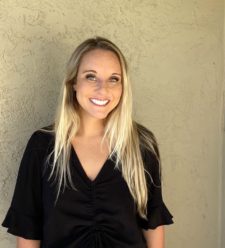 Alisa Lego is a second-year graduate student and candidate for Master of Science in Speech, Language and Hearing Sciences at San Francisco State University. Alisa is specializing in AAC through San Francisco State University’s federally funded Project Building Bridges. Alisa is also a candidate for the Autism Spectrum Graduate Certificate. Through Project Building Bridges, she has joined the Nika project and is providing resources for individuals with complex communication needs both locally and across the globe. You can follow Alisa on Instagram at @newfriendscollective.
Alisa Lego is a second-year graduate student and candidate for Master of Science in Speech, Language and Hearing Sciences at San Francisco State University. Alisa is specializing in AAC through San Francisco State University’s federally funded Project Building Bridges. Alisa is also a candidate for the Autism Spectrum Graduate Certificate. Through Project Building Bridges, she has joined the Nika project and is providing resources for individuals with complex communication needs both locally and across the globe. You can follow Alisa on Instagram at @newfriendscollective.
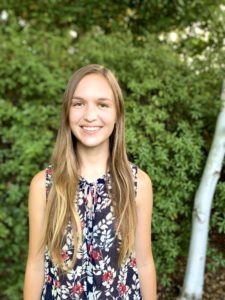 Beth Lytle is a second-year graduate student and candidate for Master of Science in Speech, Language and Hearing Sciences at San Francisco State University. Beth is specializing in AAC through San Francisco State University’s federally funded Project Building Bridges. Through Project Building Bridges, she has joined the Nika project and is providing resources for individuals with complex communication needs both locally and across the globe.
Beth Lytle is a second-year graduate student and candidate for Master of Science in Speech, Language and Hearing Sciences at San Francisco State University. Beth is specializing in AAC through San Francisco State University’s federally funded Project Building Bridges. Through Project Building Bridges, she has joined the Nika project and is providing resources for individuals with complex communication needs both locally and across the globe.
:::::::::::::::::::::::::::::::::::::::::::::::::::::::::::::::::::::::::::::::::::::::::::::::::::::::::::
You can find posts for previous months in the School Year of Core Vocabulary Words below.
Filed under: Featured Posts, PrAACtical Thinking
This post was written by Carole Zangari
